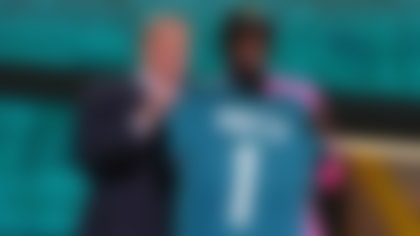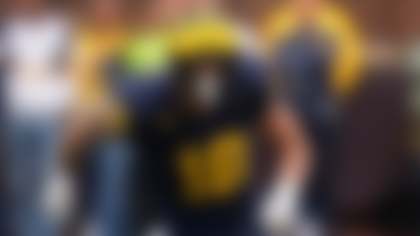It was two and a half years ago, when Bill Parcells -- the man who unearthed Tony Romo as an undrafted free agent for a $10,000 signing bonus -- diagnosed Romo in a way that seems prophetic now.
"I get a sense of urgency on his part," Parcells told me in the middle of the 2014 season. "I'm not saying time is running out. But you know he's gotten nicked up here and there, and that can play on your mind about what the future holds."
It was the last full season Romo would log, the last time he would play in the playoffs, the last real clips for his personal highlight reel. Time did run out for Romo on Tuesday with the news that he will step away from football to begin a career in broadcasting with CBS.
That Romo almost certainly would've had a chance to play for a Super Bowl contender in Houston if the Cowboys had released him -- that was clear at least week's Annual League Meeting after talking to people familiar with the Texans' plans -- gives this decision a melancholy "what might have been" feel. Romo is one of the great, up-from-nowhere success stories in NFL history, a player Parcells nurtured slowly after signing him in 2003 until he was ready to start in 2006. Nobody could have imagined then that he would be the heir to Staubach and Aikman -- and the cold reality is that he never quite was that.
There were but two playoff victories and no Super Bowl championships, as desperately as Cowboys owner Jerry Jones wanted one for Romo. There was the thrill of his derring-do play and heartbreaking miscues and injury after injury. There was a late-career bid by the Cowboys to build an offensive line to protect him and a running game to support him, and those things will now benefit the next one, Dak Prescott. There was, unquestionably, underappreciation for a quarterback who won 61 percent of his starts, set Cowboys passing records and then handled his own diminution with extraordinary grace.
Being the quarterback for the Dallas Cowboys is one of the great star turns in sports. It is also one of the most humbling. Romo knows both sides of that.
None of this rules out Romo stripping off his broadcasting blazer to put the uniform on again. He will be the first phone call if a team loses its starting quarterback and Romo is not so many months removed from his emotional passing of the baton to Prescott that all of the seething competitiveness would have leaked out of him.
"If you think for a second that I don't want to be out there, then you've probably never felt the pure ecstasy of competing and winning," Romo said last November. "That hasn't left me. In fact, it may burn now more than ever."
Maybe it still does, maybe it always will. It might be difficult for Romo to live with at times, particularly if it is the Cowboys who come calling to tempt him. Romo clearly struggled coming to grips with his time in Dallas being over -- he wanted one last chance to win back his job, even as Prescott surely had seized it last season -- and being the savior, even one with a bad back and a long future in commentating ahead, has to hold some appeal.
It is easy to root for the Peyton Manning-esque ride into the sunset for Romo, too -- although Romo, if he had gone elsewhere, was unlikely to get the soft landing that Manning got, finishing his career in the care of another former quarterback who knew exactly what was necessary to get a star in his twilight over the championship finish line. But this time around, John Elway and the Denver Broncos were satisfied with what they had -- Trevor Siemian and Paxton Lynch are not Tim Tebow -- and were reluctant to stunt the youngsters' development by inserting Romo into the lineup.
With no competitive courtship to look forward to as a free agent, Romo chose the safer, more comfortable path. And there is something admirable about that.
There was urgency of a different sort than Parcells imagined, an urgency to figure out what was next. In that way, Romo has managed to go on his own terms, perhaps without the level of success he had yearned for, but with him in control of his future. He had some options -- many more in television than football, as it turned out -- and he picked the one that best fit him. Ian Rapoport reports that Romo will join CBS this season to replace Phil Simms as an analyst with Jim Nantz on game broadcasts.
Those of us on the outside might think he still had something left, and we wanted to see it. But only Romo knows how his back feels, and where his head was about playing elsewhere. Two and a half years ago, he already sounded wistful about how fleeting it all was.
"I understand how fast your career goes," he told me then. "When you have opportunities, it's time to push it. We haven't accomplished anything. It's time to put our heads down. When you're young, you feel like you have time. We had some success, but we ultimately didn't move on. You think you'll have multiple opportunities. But injuries happen. Players go to other teams. That sense of urgency has always been there.
"But as you get older, you just recognize when your team has some ability compared to other years, you just can't squander it. You've got to do everything you can to have a chance to get deep in the playoffs."
There never was that deep run, with the two Romo playoff victories coming in the Wild Card Round. But Parcells has a favorite quote that he learned from Marv Levy -- "When you're thinking of retirement, you're already retired" -- and Romo might have foreshadowed this decision best of all in that concession speech last November.
"I feel like we have two battles or two enemies going on: one with the man across from you and the second with the man inside of you," Romo said. " I think once you control the one inside of you, the one across from you doesn't really matter."
On Tuesday, Romo seized control of the one that mattered.
Follow Judy Battista on Twitter @judybattista.












